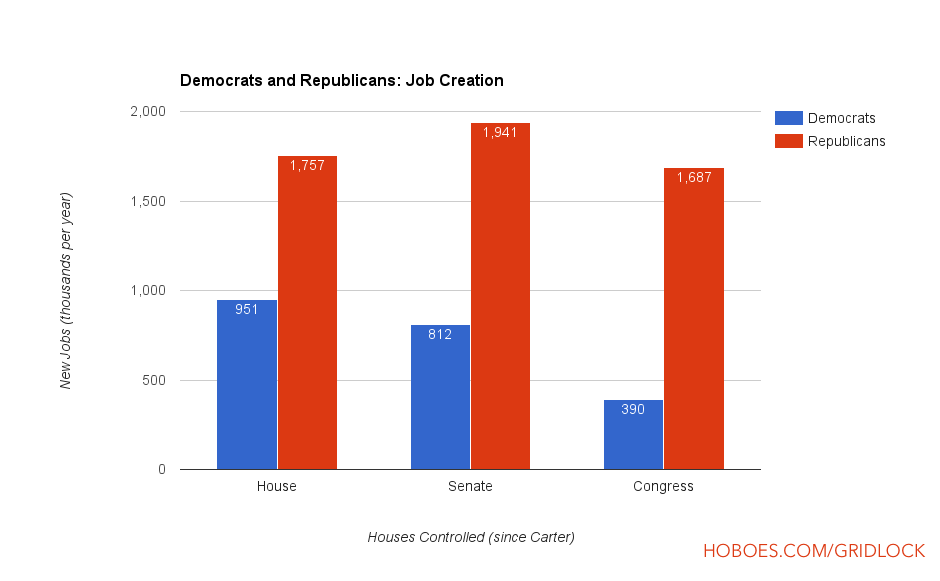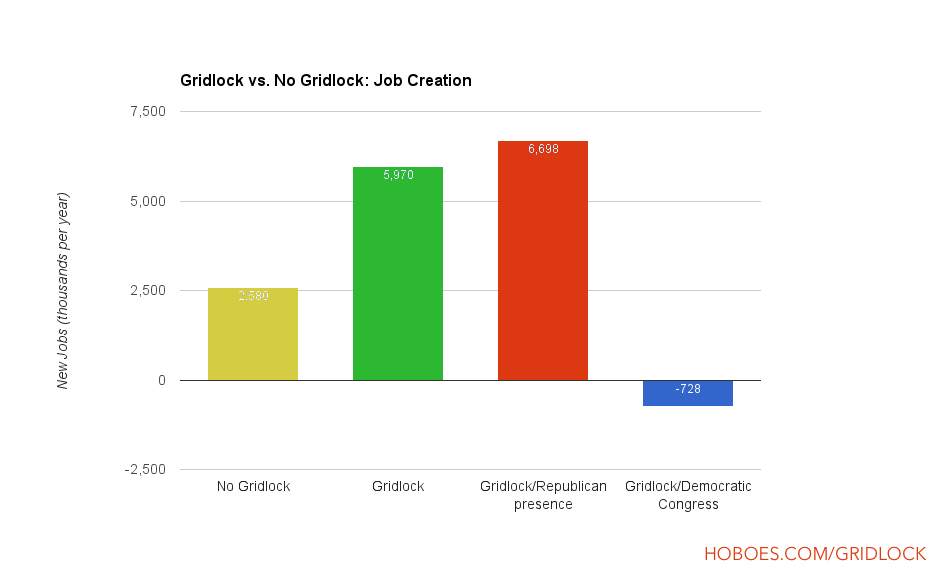Who creates more jobs, Democrats or Republicans?

Whether across an individual house or across both houses, more jobs are created when Republicans are in control than when Democrats are.
There’s a very odd meme going around purporting to show that Democrats create more jobs than Republicans, by showing the number of jobs created when each party held the White House. It’s an odd graph because it deliberately hides its data. For example, rather than showing us the year, it only shows us the President. What about Congress? We can’t tell, because whoever made the graph deliberately hid that info.
I’m also not sure that the methodology is sound even given that: it counts jobs from the passing of the first budget in September (in the modern era), as if the mere passing of the budget, rather than its effects, is what allows the private sector to create jobs.1
The real problem with this graph, however, is how much it legitimizes Jonah Goldberg’s claim that the left are fascists at heart. The graph focuses on a single leader rather than on the legislature. It’s typical of the left to look to an imperial executive rather than to the legislature. It’s the legislature that actually creates policies that affect the ability of businesses to start and expand. The legislature doesn’t always match the White House, and in fact often doesn’t.
So, what happens if we look at the same data given the same constraints for the House and Senate, as well as for when Congress doesn’t match the White House? The data is available for download into a spreadsheet from the Bureau of Labor Statistics.2
I chose to start in 1976, with President Carter’s 1977 budget, because that was the start of the modern era; before that, the two parties weren’t much different when it came to economic policy.3 Nixon, for crying out loud, supported full government control over wages and prices, and in fact implemented them. Economically, Carter wasn’t a big change from Nixon. With Carter and on, however, Republicans have claimed to be against government control4, and Democrats have continued to claim to be for government control by national experts.

Gridlock increases private-sector job creation… as long as Republicans hold at least one house of Congress.
Just as with the meme, I put the party in power the year after they were elected, starting with the budget at September 1 of that year. So, for example, voters put Republicans in power in both the House and the Senate in 1994; they’re listed for 1995. And the budget starts September 1 1995.
Pulling that data out, it’s pretty clear that Republicans in Congress are better for job creation than Democrats using this methodology. If Republicans hold the House, job creation increases; if Republicans hold the Senate, it increases even more; and if Republicans hold both the House and the Senate, it increases even more than that. A Congress controlled by Republicans resulted in over four times the job creation in the private sector as a Congress controlled by Democrats over this time period.
But even more important: gridlock creates jobs. Or, more likely, gridlock allows people to create jobs with less government interference. A Senate of Democrats against a House of Republicans resulted in the most job creation; a Senate of Republicans against a House of Democrats resulted in the second-most job creation.
Gridlock also seems to allow more jobs to be created when comparing Congress to the White House, as long as Republicans hold either the House or Senate. Gridlock with a Republican President and a Democratic Congress resulted in the absolute worst job creation by the private sector: a loss of 728,000 jobs per year.5 Gridlock the other way, with a Congress of Republicans and a Democrat in the White House, was in third place for job creation.6
Gridlock across the House, Senate, and the White House7, on average, resulted in 2.3 times as many jobs created per year. Gridlock when Republicans held at least one house of Congress resulted in 3.0 times as many jobs created per year.
Gridlock only looking at Congress (that is, when one party held the House and another party held the Senate) resulted in 2.4 times as many jobs per year than if one party held both.8
By the count of job creation, gridlock is a great blessing in the United States—as long as Republicans held at least one House of Congress, of course. While voters aren’t likely to change their votes based on this, there are other serious real-world implications. There are people calling for a parliamentary system in the United States, and they do so specifically to end gridlock. Parliamentary systems end gridlock because the head of state is elected by the legislature, which means that the party who controls the legislature also controls the White House. By these numbers, that’s a very bad idea.
In response to Broken windows at the ATM: I had my own personal broken window this week. Not a big fan of obstructing progress for make-work jobs.
Thomas Sowell would likely call this an example of the vision of the anointed: that merely having intentions is what matters, not the actual effects of the policies created. Since the intentions are what matter, waiting for the policies to be implemented and their effects to ripple through the economy is unnecessary.
↑I’m pretty sure this is the same place that zfacts created that odd graph from, because it’s from the same source and a random sample of the numbers match up exactly. (Note that as I write this, the zfacts web page where they explain their data has been suspended—I’m going to guess from traffic due to the meme going wild.)
↑If it matters, the numbers remain in the same order if you go back to 1939 as the original zfacts graph did. They are flattened, however, as you would expect given less of a difference between the parties.
↑They don’t always follow up on it, but in order to get votes they need to claim it; the point is that starting with Reagan Republicans have had a different economic philosophy, and that this has been reflected in some of their actions in Congress.
↑The only other combination that resulted in an average loss of jobs was when there was a tie in the Senate, but that only happened one year, so the number is its own outlier.
↑A cynic might say that Democrats in Congress are willing to embarrass a Republican in the White House without regard to what happens in the rest of the country, but that Republicans will not wish to similarly punish the country when the country puts a Democrat in the White House.
↑I’ve defined gridlock as no party held all three of the House, the Senate, and the White House.
↑Why, however, do Democrats do so much better than Republicans in the White House? The answer seems to be that (a) the real factor in job creation is Congress, that (b) Republican congresses do better at job creation, and that (c) in the modern era, Democratic presidents tend to end up with Republican Congresses, where Republican presidents tend to end up with Democratic Congresses. Reagan left office with a Democratic Congress (as did Bush I). Clinton left office with a Republican Congress. Bush left office with a Democratic Congress. And Obama will leave office with a Republican Congress.
Since Democratic presidents end up with Republican congresses, Democratic presidents do better than Republican presidents.
↑
- Bureau of Labor Statistics: All private employees at Bureau of Labor Statistics
- “All employees, thousands, total private, seasonally adjusted.”
- Job Creators: Democratic Presidents: Steven Stoft
- The hard left, those who see themselves as the anointed, are always looking for leaders who control the world, autocrats who ignore the legislative process. Ascribing job creation to presidents, when it’s congress who makes laws, is just another aspect of this fascist perspective.
- Liberal Fascism
- The story of how the National Socialist German Workers Party and the fascist government takeover of businesses became defined as a conservative movement by socialists and leftists who believe the government should control businesses.
- Party divisions of United States Congresses at Wikipedia
- “The following table lists the party divisions for each United States Congress.”
- The Vision of the Anointed
- Would you believe that good intentions can defy the law of gravity? If not, you wouldn’t make a good politician in today’s America.
- Westminster, D.C.?: David Brady at Commentary
- “The case for parliamentary democracy rests on the mobilization of power: A majority-party parliament is elected by a country’s citizens. The parliament then elects a prime minister. The executive and legislative powers are politically aligned and structurally fused. This makes for a relatively unopposed head of government and the quicker and easier passage of laws.”
- Private-sector job creation spreadsheet (Zip file, 38.7 KB)
- This is the Google Spreadsheet I used to look at the BLS data. It includes the BLS private-sector jobs delta dump.
More Congress
- Democrat Chris Murphy: Obamacare is “the end of health care”
- From the mouths of hypocrites, comes wisdom. It’s almost biblical.
More job creation
- “Jobs Americans won’t do” is pure BS
- Not only is “Jobs Americans won’t do” bullshit, everyone knows it’s bullshit. Not only will Americans do dirty jobs, in a country of 400 million there are a lot of people who love to do these jobs.
- Is job loss to automation inevitable?
- We aren’t losing jobs to automation. We’re losing jobs to an impenetrable regulatory morass and artificial costs added by establishment politicians. Punishing companies for having businesses in the United States only makes companies not start up in the United States.
More partisanship
- Ted Cruz: The anti-extremism candidate?
- Do we really have two political extremes, or do we just have two very close sides that talk extremely different? Politicians can combat the increasingly extreme rhetoric in politics by, first, doing what they promise, and promising what they can do; and, second, by using rather than bypassing the legislative process that the founders designed specifically to dampen extremism.
- The Wisdom of Partisan
- Throughout history, the people willing to split the baby have been the people who win. Can we break that thread?
